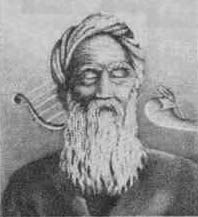Rudaki
| Rudaki | |
|---|---|
 |
|
| Adam of Poets | |
| Born | 858 CE Rudak, Samanid Empire (present day Tajikistan) |
| Died | 941 CE (aged 83) Rudak, Samanid Empire |
| Major shrine | Rudaki Mausoleum, Panjakent, Tajikistan |
|
Tradition or genre
|
Ghazal, Qasida,Rubais |
| Major works | "Lament in Old Age", "Mother of Wine", Kalila va Dimna |
Abu Abdollah Jafar ibn Mohammad Rudaki (Persian: ابوعبدالله جعفر ابن محمد رودکی, entitled آدم الشعرا Ādam ul-Shoara or Adam of Poets), also written as Rudagi (858 - c. 941), was a Persian poet regarded as the first great literary genius of the Modern Persian language. Rudaki composed poems in the "New Persian" alphabet and is considered a founder of classical Persian literature. His poetry contains many of the oldest genres of Persian poetry including the quatrain, however, only a small percentage of his extensive poetry has survived. Rudaki's "Nahr and 'Ayn," "Khing- but and Surkhbut," and "Wamiq and 'Azra" have prospered on the riches of the oral tradition of folklores.
Rudaki was born in 858 in Rudak (Panjrud), a village located in the Samanid Empire which is now Panjakent, located in modern-day Tajikistan. Even though most of his biographers assert that he was completely blind, some early biographers are silent about this or do not mention him as being born blind. His accurate knowledge and description of colors, as evident in his poetry, renders this assertion very doubtful. He was the court poet to the Samanid ruler Nasr II (914–943) in Bukhara, although he eventually fell out of favour; his life ended in poverty.
Early in his life, the fame of his accomplishments reached the ear of the Samanid Nasr II ibn Ahmad, the ruler of Khorasan and Transoxiana, who invited the poet to his court. Rudaki became his daily companion, amassed great wealth, and become highly honored. It is claimed that he well deserves the title of the father of Persian literature, or the Adam or the Sultan of poets even though he had various predecessors, because he was the first who impressed upon every form of epic, lyric and didactic poetry its peculiar stamp and its individual character. He is also said to have been the founder of the diwan, or the typical form of the complete collection of a poet's lyrical compositions in a more or less alphabetical order, which all Persian writers use even today. He was also very adept singer and instrumentalist (Harp).
...
Wikipedia
